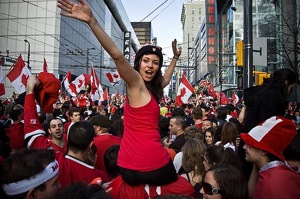
The Paralympic torch is out, Alexandre Bilodeau has moved on to new races, John Furlong has placed flowers on Nodar Kumaritashvili's grave and front-end loaders are erasing all signs of Livecity Yaletown.
So what remains of the Olympic experience?
For many, what will endure is the memory of a brief month-long period when the unlikely became commonplace, average people did extraordinary things, co-operation proved the foundation for successful competition, many homeless people found shelter and total strangers talked like old friends on the Skytrain.
In short, it was much like a world many of us would like to live in full-time.
What a contrast to pre-Games Doomsday scenarios that predicted hapless commuters, locked in traffic chaos, deafened by the thumping of the Integrated Security Unit's surveillance helicopters.
It all started to turn around -- as it always does, according to Games veterans -- with the torch relay.
By the time Ken Lyotier, the former binner who runs United We Can, carried the torch into Livecity Yaletown, the entire country was on fire.
"You can't believe what a high it is," he told friends, "to run through tens of thousands of people who are all happy!"
Why should that be such a rare occurrence?
The relay turned the ultimate insider event upside down. The people became the focus.
Tragedy and triumph
The Olympic story switched away from obsessions with security, gold medal hockey tickets, cost overruns and the movements of IOC limousines.
Suddenly we were riveted by the death of a 21-year-old Georgian luger; the story of Bilodeau, a Canadian gold medal-winner whose hero was a brother with cerebral palsy; Joannie Rochette's triumph over tragedy -- and eventually, shockingly, the upset victory of the Japanese men's sledge hockey team.
Above all, the Games became the story of people -- thronging the streets, jamming in front of any screen, and celebrating the exhilarating efforts of athletes from all around the world who competed simply for the sheer joy of it.
It was a rare case in which the people finally took the lead and the leaders came behind, waving their Olympic mittens.
In retrospect, it was inevitable. The Olympic Games are, in the end, a sporting event.
Despite the massive entourage of corporate sponsors, ambush marketers and global broadcasters, the athletes make it real. It's their heart and spirit, and their commitment to the beauty and community of sport, that puts all the other controversies into perspective.
Women made a statement
It was the heartfelt appeal to the IOC by gold medal skater Catriona Le May Doan that gave a decisive lift to Vancouver's bid in Prague in 2003, when we won a cliffhanger IOC vote by 56-53 with three providential abstentions.
(What other contest of such magnitude is settled by a secret vote of about 120 people as random and diverse as Finnish NHL great Saku Koivu and Prince William of Orange?)
Le May Doan told the IOC how Vancouver's Games could provide a major boost to sport in Canada. To many in the room, her passion closed the deal. She wasn't alone. Countless Canadian athletes -- notably many women -- were critical to our success. Runner Charmaine Crooks, an IOC member, and swimmer Marion Lay, the first chair of the bid committee, come to mind.
They helped keep the Vancouver bid's focus on inclusion, sustainability and the athletes, most of whom will train, compete and retire with nothing more than the satisfaction of playing at the global level. So it was fitting that Canada's women athletes turned in such a powerful performance in Games at which the IOC prohibited women's ski-jumping.
It was not the only example of the elite, autocratic and corporate-oriented IOC paradoxically producing its polar opposite.
A sense of the possible
What could provide a sharper contrast with the IOC dignitaries, ensconced high above the opening ceremonies in their gilded box, than the 25,000 unpaid, blue-coated volunteers, safely ushering hundreds of thousands of fans to and from events?
Without them John Furlong would have been helpless.
Like the athletes, they made their contribution for the sheer pleasure of it, not with any expectation they would ever become rich or famous.
And is it possible that the brutal, win-lose world of reality television -- "you're fired!" -- could ever be replaced with equally real tales of heroes like Brian McKeever?
The legally-blind cross country skier, devastated to be cut from the Olympic relay team, went on to win three gold medals in the Paralympics, guided by his brother Robin.
Like so much that happened during the Games, their achievement illuminates what is possible in a world focused on co-operation, inclusion and the celebration of diversity. Ultimately, that may be the Games' greatest legacy: a sense of the possible.
Imagine a world in which the achievements of everyday people are celebrated, most of us take the bus, First Nations are full partners, women take the lead, civil rights are upheld and mobs of happy people throng the streets!
Don't call me crazy. I've seen it with my own eyes. ![]()
Read more: 2010 Olympics














Tyee Commenting Guidelines
Comments that violate guidelines risk being deleted, and violations may result in a temporary or permanent user ban. Maintain the spirit of good conversation to stay in the discussion.
*Please note The Tyee is not a forum for spreading misinformation about COVID-19, denying its existence or minimizing its risk to public health.
Do:
Do not: